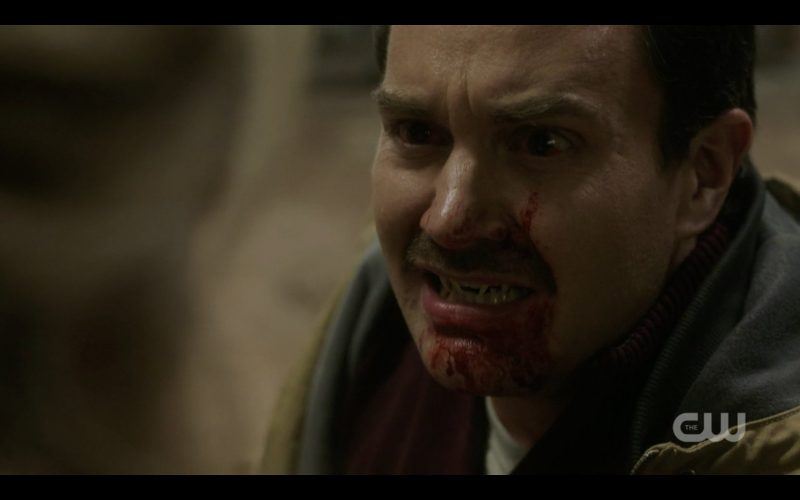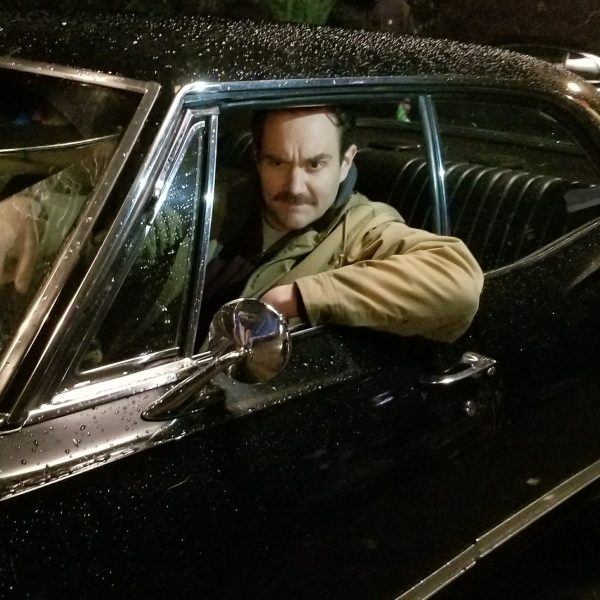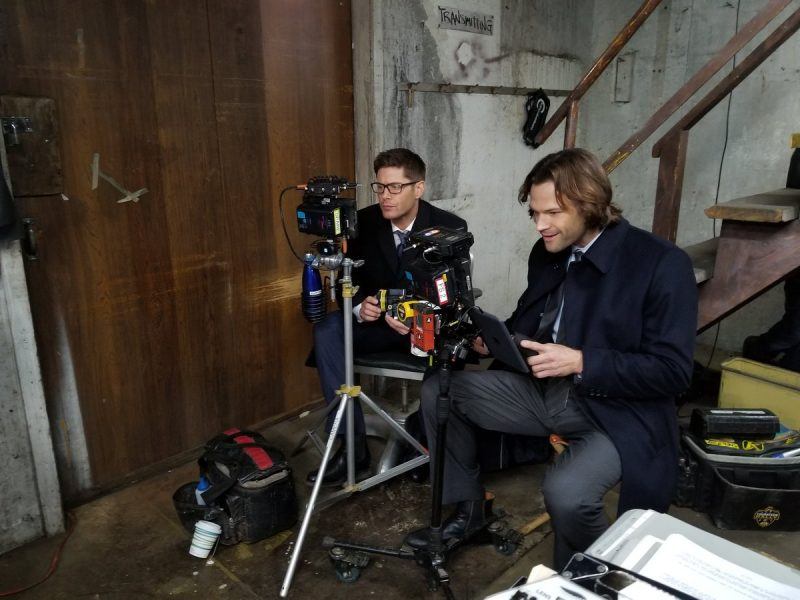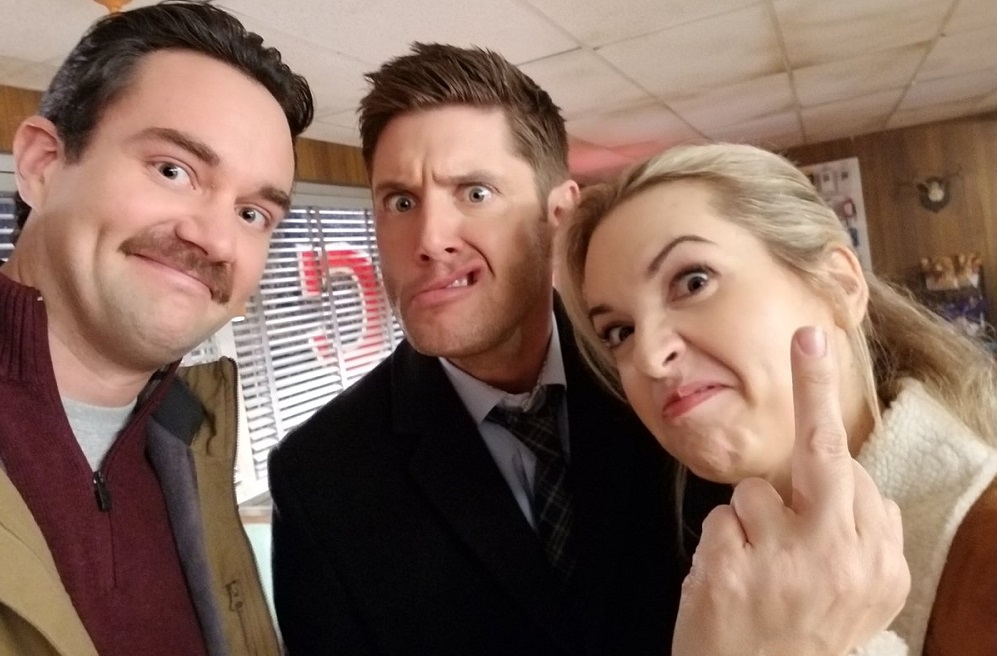
I enjoyed the character of Doug when he was introduced back in Season 11, so I was overjoyed to see Doug return in last week’s Supernatural ‘Breakdown’. Which means I couldn’t wait to talk with Brendan Taylor, the actor who brought Doug to life. We caught up by phone the day after the episode, and despite being interrupted by multiple bouts of laughter and several US-to-Canada phone glitches, we had a great chat.
Doug returns as the love interest of Sheriff Donna (Briana Buckmaster) who is also one of the stars of the proposed Supernatural spin-off, Wayward Sisters.
We’ve split Brendan Taylor’s interview with Lynn into two parts as it’s very long as we know our Lynn gets deep with everyone on Supernatural.
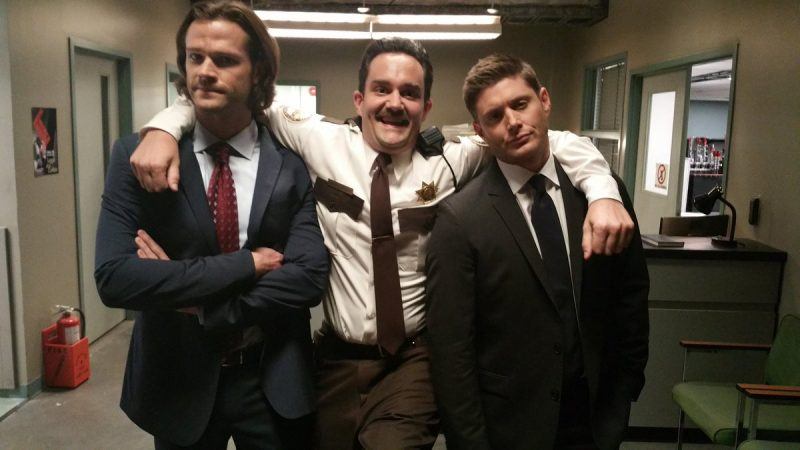
Lynn: I loved that episode so much last night!!
Brendan: I’m quite happy with it! Obviously, reading the script, it was fun to read, and I think it was nice that compared to some episodes that maybe have more fantasy involved, this one had more realistic elements.
L: It seemed like an old school Supernatural episode, getting back to those horror-film-in-42-minutes type thing, yet it also had emotionality and humor. That’s kinda what Supernatural is known for, being able to combine all those things in a way that actually works. It really was a solid episode.
B: Yeah, it felt good. Amyn [Kaderali], the director, was really great. He gave us a lot of leeway and took a lot of our input. There were a couple of lines in there that Briana and I were able to offer some thoughts because Amyn hadn’t directed the show before, so we would say, we think the characters might say this or say it this way, and he was all for it. It was kinda cool.
L: I love when that happens, and that Supernatural seems to be such a collaborative show. I have a game I play with Jensen Ackles where I try to guess all the lines that aren’t scripted, because sometimes they’re some of my favorites. Can you give me any examples of when that happened in this episode?
B: Yeah, sure. One that I was thinking of that I thought worked well was when I go to sit in the car with Jensen and chat and give him the file, and I guess try to get some advice about Donna and so forth. His line is “well you’ll always be there for her, right?” And the scripted line is “absolutely” or “of course.” But what do I say? I thought Doug would say “you betcha.”
L: (laughing) Oh yes
B: Because he would! And that sort of dialect, anyone else saying “oh you betcha,” it could kinda come off as maybe sarcastic, but to a Minnesotan…
L: Yes!
B: There are many instances when Briana says that and it’s like, yes, that’s her way of saying it.
L: I like that because in a subtle way that sort of establishes the relationship and the closeness and the similarity of Donna and Doug, you know? He says it too, like he’s right there with her, which is part of his importance to her.
B: Exactly, yeah, that’s why I thought it was important too. The reason why we’re together and we get along – although the show alludes to us being together now for two years almost in real time, since Plush aired – we think and do things the same way and speak the same way, and I think that speaks to their connection for sure.
L: I was impressed with some of the subtle things you did that I think showed us early on that maybe Doug was gonna have a problem with all this. There’s a scene where Doug and Dean and Marlon (the cashier-turned-vampire) are watching the live auction video for the first time, and Doug just flinches and turns away. It seemed to telegraph that even though obviously that’s a normal reaction, this isn’t going to be Doug’s thing.
B: I think that’s a testament to the writing [by Davy Perez] as well, that we even have a scene where we all have to watch that. We all objectively are watching something that normally happens in Supernatural, people getting beheaded or whatever, but to watch someone see that as an outsider, I think we almost forget that Doug doesn’t know that. It’s not really brought up until then; it’s early on in the episode. To us as viewers who watch the show, that’s all normal in this world, but Doug is a reminder that this is not normal! (laughing) It’s not supposed to be normal.
L: (laughing) Yes, we Supernatural viewers end up with a skewed view.
B: And having said that, Doug is a cop, and he could have easily come across something like that, but he’s also a small town cop, and that’s a pretty intense thing to come across, the organized mutilation of people…
L: At a live televised auction no less… Even for Supernatural, that was tough to watch.
B: Yeah. I think it might be written that I look away, but I definitely made a point of making it clear that Doug can’t watch this easily.
L: I liked that, the sort of telegraphing of how he’s going to react to all this. And I liked that in the first episode we saw Doug, he was mostly a comic character, he was sweet, he cared about Donna, but mostly he was there to be funny. And in this one, you definitely did get to be funny, but you got to show many other parts of Doug. He was brave, he was willing to do whatever, but at the same time, and this was beautifully written – he says I got into this to help people, not to behead vampires.
B: Yeah, and I think that’s another important thing. You’re right, there’s a lot written that’s funny but there are still moments even in the first episode where Donna is a little harsh with me, and I call her out on it. By the end I say like you know, you’re treatin’ me like a punching bag. I like that resolution and Doug is like I’ve got baggage too, and I’m a person as well but a person who cares. And again, at the end I think a lot of people – I’ve seen some of the reactions, and I’ve been quite surprised, I didn’t know how this would all go down, to be honest. You would know better than me how many people have been given an opportunity to be a hunter and have turned it down willingly.
L: Here’s the interesting thing, and I think it’s why this episode hit me so hard emotionally. I study fan psychology, and I’ve written lots of books on Supernatural and its appeal, and Doug’s struggle here is part of what made this episode so poignant. It was a call back to the times early on in Sam and Dean’s life when they had to come to the realization that they couldn’t sustain relationships with people outside the life. Either the person would leave because they couldn’t deal with it, or they would lie to them and that would come out and the person would feel betrayed. So watching Donna go through that with Doug, I think it was hard for Sam and Dean, it brought that back. And for long time viewers, it brought that back too.
B: That’s a good point. Knowing the show somewhat and its history, it was important to see that – I mean, I saw it when it was all put together in editing, I wasn’t watching what other actors were doing at the time (laughing) – but seeing Sam and Dean respond to our issue it’s like you said, you can tell that there’s a history, they’ve been through this before. And then they have that chat in Baby.
L: Yes, and that was so important. This episode was all about Doug and Donna, but it was also about Sam and Dean. It also gave us insight into the Winchesters, which is what the show is always about and why I love it so much.
B: Another thing that I noticed or wanted to mention is that a lot of people were sort of asking, why did you [Doug] run away, why didn’t you stay? That last scene is a couple minutes, but in the time frame of waking up after being turned, trying to figure out what the hell’s going on – I don’t know how much memory you have of being a vampire (laughing) – but and then waking up and everyone asking how you’re doing and is Wendy okay and yeah and do you wanna join us, only having learned about these monsters that I became in at time frame of what, a half hour?
L: Yeah and you were unconscious, so you’ve had like five minutes to process it!
B: Yeah, it’s like I haven’t had the time to process any of this, and that combined with the dishonesty….You know, this was two years for them…
L: Yes, and she hid it from him all that time. And that was part of what happened with Sam and Dean’s other relationships as well; they also didn’t tell the truth mostly, so for long-time fans, that hit hard. But I thought it was written, and you played it in a way that was 100% believable. That’s how I expected Doug to react.
B: Yeah, I read it and of course when I found out I was back on the show, I was like OMG he just goes away? But then you do read it more, and it just makes sense, it’s too much to handle. I think that amplifies more what the hunters do also, to show how important it is and how different it is, what they do. Otherwise, everyone would be running around killing these monsters, and what’s special about that?
L: And part of why they are such tragic heroes is that they make such sacrifices, and it is something special.
B: It reminded me of Peter Parker and Mary Jane, that’s the common theme, they’re always back and forth and he can’t have her close because his enemies will know. She’s his biggest weakness etc.
L: A theme on Supernatural as well, with Sam and Dean being each other’s biggest weakness – anyone you care about. And the reason the whole tragic hero thing is so compelling is because of that sacrifice and loss. Briana tweeted that you were an awesome scene partner in that last scene, you allowed her to go deep. What was it that you did that allowed you to give each other the ability to bring out such emotion?
B: I didn’t know the director before this, but he pulled us aside – we shot that end scene my first day, not the first day of the episode, but my first day — Which, to be honest, I was a bit nervous about just jumping in right away.
L: OMG yes!
B: Yeah, but it ended up being a bit of a blessing in disguise. As you know, those guys [Jared and Jensen] – I can’t keep a straight face around them…
L: You and everyone else…
B: They mess around, and they’re so good at it. Up to the very millisecond that the camera rolls, that they yell action, they’re screwing around, and they’re so dialed into what they do, they can do that. I mean, I wanna screw around more than anyone, but I don’t get the daily practice that they do. (laughing) We can get into it later, but there are some scenes that I just couldn’t deal.
L: Oh yes, that’s on my list of questions. I was just doing the serious ones first….
B: Okay, so that scene, the director took us into the motel room set, and we got into our selves, and he did a sort of rough blocking on it and Briana and I both – it’s one of those things, we’re so lucky to be paired with someone who takes what we do seriously. And Briana is very well trained in what she does, in theater and musical theater, and she’s such a committed actress. I’m trained the same way in theater, and I take what I do very seriously too, and I want to spend as much time to sort of give as much as I can of myself to it. The more you honor that situation, the more it means, you know? Because if you look at it a certain way, not honoring that situation is doing a disservice to everyone who’s been through that. And that goes for every acting performance, whether it’s a relationship scene like that that people can relate to, or something very tragic or a tragedy that not everyone experiences. It’s your task as an actor to follow up that story, so you better honor it for what it is.
L: That makes so much sense to me as a psychologist. The realism of it, that’s why it’s so validating to all of us to see our stories told, and that’s how you make sure that works. I love that. I would imagine that when one person is able to be vulnerable and open, it allows the other person to go there too.
B: Yeah, exactly, it’s like ‘oh okay, we’re going there? We’re going there.’ I think that’s true. Oh, they cut a really great scene, unfortunately.
L: Oh no, what was it?
B: There’s a scene where Doug and Donna are eating fast food in D Train. It was right after Dean told Doug that they were related. We’re eating fast food, but it’s sitting there getting cold. I said something about “well, it’s the sort of thing you tend to say…” and before we got to talk about it, Dean calls and we have to go. I could see why they cut it, but it was a nice little moment that built the new awkwardness between us before she gives me “the talk.”
L: There’s always something that gets cut out that we find out later and are like aww damn.
B: It was a good little scene. But it was important to give all that, to be there for each other. She’s so great that way. And I also need to mention that the boys are too. In that scene, that was my first day and we’re doing coverage, and it’s a pretty emotional scene to repeatedly do.
L: I’ll say
B: And there are a lot of set ups and four actors, and I don’t know how much you know about the filming process, but they will often sort of jump ahead if the script is in two different parts and we only have to shoot the last half and the first part is off camera so we just sort of pick it up and move on. That only works sometimes, but you’re sometimes robbing the momentum of the scene.
L: By picking it up in the middle? I can imagine.
B: If you don’t act out the whole thing and you just start on this word and keep going, but everything comes from the previous moment, so performance wise it helps to go back, but there’s pressure to move on. And I think it was both Jared and Jensen who — it’s the very last moment when I leave, and we were told to kinda jump right in, and they suggested, do you want to say that? Do you want to go back to the beginning of the scene? And you know, they’re both off camera, it’s not about them, the coverage is on me.
L: Right.
B: And they’re like, we’ll go back. And that’s the coolest thing about them being at the helm of the show. They’re like okay, let’s go back, and everyone just drops into line, the cameras move out of the way, it’s like whatever needs to happen for the core of the scene.
L: And they could so easily, after 13 seasons, just not care about the show so much, or about the other actors’ performances, but they do care. Enough to ask what you needed, and to make it happen.
B: Exactly, that’s really true. It’s very common, even with certain name actors, they’re often not even there for your coverage. They put someone in, a stand in, to read their lines.
L: That would be so hard. I’ve heard a lot of guest actors say that Jared and Jensen just don’t do that.
B: It’s a very selfish thing to do, when people do that. As far as I’m concerned, you can’t have a scene without the person there. Who cares where the cameras are, it doesn’t matter. That’s secondary. It’s about the scene, and everyone needs to be there and be invested and be at the same level of commitment when you’re not on camera because you expect it when you’re on camera.
L: Exactly. I do think it’s pretty extraordinary that they still care so much about the show and the characters.
B: They really do. Jensen has directed several episodes and he – I was so impressed because I spent years on the other side of the camera doing set dec – so I know that side very well. There are other skills you learn from being an actor too, how to be on your mark and in the light, and when there’s a lot going on you still try to gauge what’s happening. I remember we were rolling one time and Jensen just said like move one foot to your right because the light is coming down here… (laughing) He just kind of moved me, he was paying attention to my light!
L: (laughing) He snapped into director mode!
B: Yeah, he just wanted to get the best out of the scene and make sure I knew that was the light set up. Because you’re not always told that, you go where you kinda go, but he just knew that. That’s pretty remarkable to see that level of skill in something that’s so specific.
L: And something that’s optional too. I’m always so impressed by their ability to joke around and then snap into character just like that, but also by how smoothly everything works on that set.
B: Yeah, I think that’s partially why it’s been going for so long, because there are lots of sets that don’t do that. And I think they all kind of know what they have, you know? They have this show that is of importance and works a certain way, and obviously, it’s a top down thing as well. If people at the top, whether it be number 1 and 2 on the call sheet, or the producers and the directors, they’re all positive committed people and I think that trickles down. Especially when you see the results and the reception. You would be an outsider if you tried to change that vibe, and it’s just not allowed.
L: And it wouldn’t be good for anyone, it works.
B: It just wouldn’t be tolerated very long.
Part 2 of Brendan Taylor’s Supernatural interview is right here.


